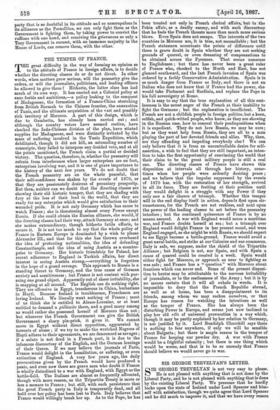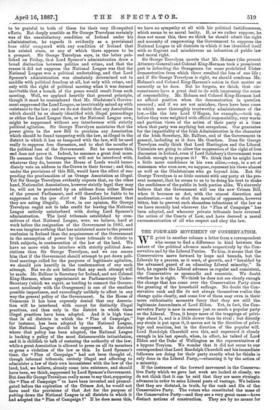SIR GEORGE TREVELYAN'S LETTER.
SIR GEORGE TREVELYAN is not very easy to please. He is not pleased with anything that is not done by the Liberal Party, and he is not pleased with anything that is done by the existing Liberal Party. We presume that he hardly looks upon the state of Ireland under Lord Spencer and him- self with satisfaction, though we quite agree that Lord Spencer and he did much to improve it, and that we have every reason to be grateful to both of them for their very ill-requited efforts. But deeply sensible as Sir George Trevelyan certainly was of the unsatisfactory condition of Ireland under his administration, he regards it evidently as a provisional beau idial compared with any condition of Ireland that has existed since, or any of which there appears to be a prospect. Sir George Trevelyan says, in the letter pub- lished on Friday, that Lord Spencer's administration drew a broad distinction between politics and crime, and that the reason it did not suppress the National League was that the National League was a political undertaking, and that Lord Spencer's administration was absolutely determined not to meddle with political freedom at all, but only with crime, and only with the right of political meeting when it was deemed inevitable that a breach- of the peace would result from such meeting. Well, we applaud heartily that general principle, though it must be remembered that Mr. Gladstone's Govern- ment suppressed the Land League, as inextricably mixed up with resistance to the law ; and we do not doubt that any Association which should be as closely identified with illegal proceedings as either the Land League then, or the National League now, might be suppressed without any interference with strictly political agitation. Sir George Trevelyan maintains that the power given in the new Bill to proclaim any Association which should be found tampering with the law, as illegal in the district in which it has so tampered with the law, will be used really to suppress free discussion, and to shut the mouths of the political foes of the Government. But he assumes this, and does not prove it. Indeed, he assumes a great deal more. He assumes that the Orangemen will not be interfered with, whatever they do, because the House of Lords would imme- diately vote an address to the Crown in their favour ; and this, under the provisions of this Bill, would have the effect of sus- pending the proclamation of an Orange Association as illegal. Yet Sir George Trevelyan evidently expects that, on the other hand, Nationalist Associations, however strictly legal they may be, will not be protected by an address from either House of the present Parliament, and will therefore be liable to be suppressed on the ipso dint of the Lord-Lieutenant that they are acting illegally. Now, in our opinion, Sir George Trevelyan ought not to take credit for leaving the National League entirely nninterfered with during Lord Spencer's administration. The local tribunals established by com- mittees of that National League, were, we believe, hard at work before the resignation of the Government in 1885, and we can imagine nothing that has ministered more to the present confusion in Ireland than the acquiescence of the Government in the assumption of power by those tribunal, to dictate to Irish subjects, in contravention of the law of the land. We have no more wish to interfere with strictly political Asso- ciations than Sir George Trevelyan, and we can assure him that if the Government should attempt to put down poli- tical meetings called for the purposes of legitimate agitation, we should join heartily in the condemnation of any such attempt. But we do not believe that any such attempt will be made. Mr. Balfour is Secretary for Ireland, and not Colonel King-Harman, whose appointment as Parliamentary Under- Secretary (which we regret, as tending to connect the Govern- ment needlessly with the Orangemen) is one of the smallest possible importance, and exceedingly unlikely to affect in any way the general policy of the Government. In the House of Commons it has been expressly denied that any Associa- tion will be interfered with except for distinctly illegal practices, and then only in the district in which these illegal practices have been adopted. And it is high time that in all districts in which the " Plan of Campaign," for instance, has been adopted by the National League, the National League should be suppressed. In districts where that policy has been adopted, the National League is backing a policy of the most dishonourable intimidation, and it is childish to talk of restoring the authority of the law, while a great Association is allowed to press on all its members so gross a violation of the law as this. In Lord Spencer's time, the "Plan of Campaign" had not been thought of, though informal tribunals, entirely illegal and affecting to administer a law of their own inconsistent with the law of the land, had, we believe, already come into existence, and should have been, we think, suppressed by Lord Spencer's Government. But does Sir George Trevelyan really mean to say that, supposing the " Plan of Campaign " to have been invented and promul- gated before the expiration of the Crimea Act, he would not have used the provisions of that Act• for• the purpose of putting down the National League in all districts in which it had adopted the " Plan of Campaign I" If he does mean this,
we have no sympathy at all with his political fastidiousness, whioh seems to us moral laxity. If, as we rather suppose, he does not mean this, then we think he should admit the right and necessity of empowering the Government to suppress the National League in all districts in which it has identified itself with so flagrant and mischievous an infraction of public law and moral right.
Sir George Trevelyan asserts that Mr. Holmes (the present Attorney-General) and Colonel King-Harman took a prominent part in defending the Orangemen for some prohibited Ulster demonstration from which there resulted the loss of one life; and if Sir George Trevelyan is right, we should condemn Mr. Holmes's and Colonel King-Harman's action in that matter as earnestly as he does. But he forgets, we think, that cir- cumstances have a great deal to do with impressing the sense of responsibility. Mr. Holmes and Colonel King-Harman had no official position when the demonstration in question occurred ; and if we are not mistaken, there have been cases in which most thoroughly trustworthy administrators of the law,—like the late Lord Oliagan, for example,—took up, before they were weighted with official responsibility, very warm and partisan views of the action of their party at a time when that party was anything but scrupulous. Our guarantee for the impartiality of the Irish Administration is the character of the Irish Secretary, Mr. Balfour, and of the Government in general, including as it does Mr. Goschen. Does Sir George Trevelyan really think that Lord Hartington and the Liberal. Unionists are going to allow the suppression of the right of free discussion in Ireland, even if Lord Salisbury's Government were foolish enough to propose it ? We think that he might have a little more confidence in his own allies,—nay, in a set of statesmen who even now, we suppose, represent his views almost as well as the Gladetonians who go beyond him. But Sir George Trevelyan is so little content with any party at the pre- sent moment, that he seems to us to be doing his beet to shake the confidence of the public in both parties alike. We sincerely believe that the Government will use the new Crimes Bill, when it becomes an Act, with the utmost discretion and moderation,—not to shut the mouths of opponents, however bitter, but to prevent such shameless infractions of the law as we have recently had wherever the " Plan of Campaign" has been adopted, and wherever private tribunals have reversed the action of the Courts of Law, and have decreed a moral excommunication of all who respect and obey the law.



































 Previous page
Previous page